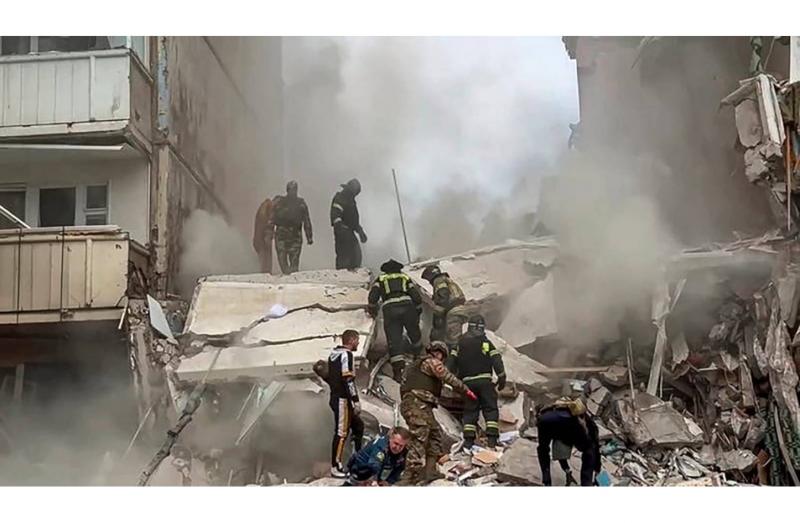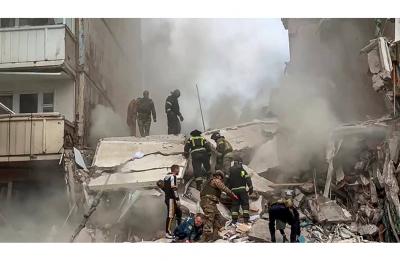In the midst of the ongoing war between Ukraine and Russia, recent developments have seen Ukrainian forces advance into Russian territory, raising numerous questions about the new Ukrainian strategy, its motives, and its potential impacts on the conflict's trajectory. An analysis by CNN suggests that Kyiv's decision to utilize a significant portion of its limited military resources in a cross-border operation appears aimed at achieving swift media gains, even though its strategic objective remains unclear.
In one of the largest Ukrainian assaults on Russia during the two-year war, approximately 1,000 Ukrainian soldiers crossed the Russian border in the early hours of August 6, utilizing tanks, armored vehicles, drones, and artillery, according to Russian officials. The analysis describes this move as potentially being "a moment of desperation or inspiration for Ukraine," pointing out that the Ukrainian military leadership undertook a rare gambit after its actions over the past 18 months were criticized for being "slow and overly cautious."
Reports emerged of fierce fighting near the town of Sudzha, from where Russian natural gas flows into Ukraine, raising concerns about a sudden halt of gas supplies to Europe. Ukrainian officials stated that the gas transportation route remains operational. Russian President Vladimir Putin characterized the attack as "a major provocation." The White House, the largest supporter of Ukraine, stated that it was not forewarned about the attack and is seeking further details from Kyiv. The Ukrainian military remained silent regarding the Kursk attack, although President Volodymyr Zelensky praised the army on Thursday for being able to create a "surprise" and achieve results. He mentioned that Moscow must "feel" the consequences of its invasion of Ukraine, adding that Russia has brought war to their lands and must feel the repercussions without directly referencing the Ukrainian assault.
CNN noted that after weeks of bad news for Kyiv, as Russian forces moved toward Ukrainian military centers in Pokrovsk and Sloviansk, Moscow was left scrambling to bolster its most critical front line: its own border. The Washington Post argued that the sudden attack on Kursk, located about 530 kilometers south of Moscow, was carefully designed to bring the war's repercussions into Russian territory, indicating that "so far, many Russians have not felt the direct effects of the conflict that has led to the destruction of numerous Ukrainian cities and towns and the displacement of millions."
This Ukrainian move may also aim, according to the American newspaper, to distract Russian forces and force them to reposition away from other areas along the front line, where Ukrainian troops have experienced a gradual retreat in recent months. However, some Ukrainian observers openly question the wisdom of this adventure, according to CNN. The network predicts that the recent incursion may fall under a "larger game strategy," intended to impact Russian gas supplies to Europe and thereby reduce a significant funding source for Moscow, as the area attacked by Ukraine is next to a Russian gas station, crucial for supplying gas from Russia through Ukraine to Europe.
It is also noted that Kyiv might be thinking of shifting its strategy from targeting Russian infrastructure remotely to deploying ground troops within Russian territory, involving risks for the Ukrainian army and posing a new challenge to the Kremlin. The analysis links this move to the arrival of Western weapons, especially F-16 fighter jets, which could shift the air power balance in favor of Ukraine, despite ongoing challenges such as ammunition shortages.
In response to the question of what motivates Ukraine to take this risky step at this particular moment, the analysis suggests other strategic motives, indicating that, for the first time since the war began, signs of potential peace talks are on the horizon. Russia may soon be invited to participate in a peace conference sponsored by Ukraine and its allies. Additionally, the number of Ukrainians supporting negotiations, although a minority, is gradually increasing, albeit slightly. Overarching all this is the looming possibility of Trump returning to the U.S. presidency, which casts shadows on Kyiv's strategic calculations.
With the growing likelihood of reaching a negotiated solution, both sides, according to the same source, seek to strengthen their field positions ahead of any possible negotiations. Regardless of the motive, this operation represents an exceptional and significant risk given Kyiv's limited resources, according to the analysis. This bold move may indicate a growing conviction among Ukrainian leadership that a fundamental shift in the conflict's trajectory or imminent strategic changes in the political or military arena are forthcoming.




